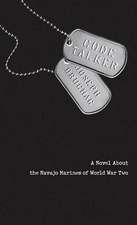Cross My Heart
Autor Sasha Goulden Limba Engleză Paperback – 11 mar 2013 – vârsta de la 12 ani
Vezi toate premiile Carte premiată
Tayshas Reading (2013)
When 16-year-old Laura della Scala learns that her older sister, Beatrice, has drowned, she is given no time to grieve. Instead, Laura's father removes her from the convent where he forcibly sent her years earlier and orders her to marry Beatrice's fiancé, a repulsive old merchant named Vincenzo. Panicked, Laura betrays a powerful man to earn her way into the Segreta, a shadowy society of women who deal in only one currency—secrets. The Segreta seems like the answer to Laura's prayers. The day after she joins their ranks, Vincenzo is publicly humiliated and conveniently exiled. Soon, however, Laura begins to suspect that her sister's death was not a tragic accident but a cold-blooded murder—one that might involve the Segreta and the women she has come to trust.
From the Hardcover edition.
Preț: 61.08 lei
Nou
Puncte Express: 92
Preț estimativ în valută:
11.69€ • 12.24$ • 9.67£
11.69€ • 12.24$ • 9.67£
Carte indisponibilă temporar
Doresc să fiu notificat când acest titlu va fi disponibil:
Se trimite...
Preluare comenzi: 021 569.72.76
Specificații
ISBN-13: 9780385741514
ISBN-10: 0385741510
Pagini: 263
Dimensiuni: 137 x 208 x 20 mm
Greutate: 0.25 kg
Editura: Ember
ISBN-10: 0385741510
Pagini: 263
Dimensiuni: 137 x 208 x 20 mm
Greutate: 0.25 kg
Editura: Ember
Notă biografică
SASHA GOULD lived in Venice until she was nine years old. She later studied fashion in London. Her favorite things are opera, ballet, and romantic movies. She now lives in the Lake District of England with her cat, Tosca, and writes about Venice, the beautiful and mysterious city she knows and loves.
Extras
1
None of us is known by our real name in here. Almost as soon as you arrive, you're christened all over again: La Grossa, La Cadavara, La Lunatica, La Trista, La Puera, La Pungenta--Fat, Deathly, Mad, Sad, Fearful and Stinky. Inside the walls of the convent, sneering adjectives are transformed, sooner or later, into names.
They call me La Muta--The Silent One. It isn't that I don't have plenty to say, it's just that most of the time I keep things to myself. Daughters learn this early. Second daughters sooner.
The Abbess used to tell me that she could see something feral in my soul--that there was something of the animal about me. A dog, perhaps, or maybe a rat. The creatures that slip into the convent at night in search of chicken bones and rotting food. It's something that she's determined to stamp out.
My life, which once belonged to my father, now belongs to her. I am awake before two for prayers and then again at five, to go and sing perfect harmonies as the Venetian sun rises behind the grilles and the bars, dancing on the marble and gold in the chapel.
The Abbess controls all the correspondence coming in and going out. Sometimes she withholds the letters from my sister Beatrice and I can't read them. Tell me your news, I beg Beatrice in writing. When will you marry Vincenzo? Does he make you happy? None of my questions can be asked without undergoing the prudish scrutiny of the Abbess. To a suspicious mind, alert to all possible evils, any of my words could somehow appear saturated with sin.
"I see everything," the Abbess tells me. "I know what is in your mind."
I used to believe her. I used to think that perhaps she really did have the power to see my secret longings leaking like olive oil from the press. Certainly, I've seen her holding our letters out in front of her by the corners as if there's a danger they'll smear her cowl or habit. As if they're greasy, grubby things.
Some of Beatrice's letters reach me. I hide them under a wooden floorboard with my own ring and with a silk-ribboned lock of her hair. Late at night, when Annalena is snoring and shifting under her sheets, I take my sister's folded ink-filled paper treasures and I read them again and again. Each of her letters carries something from the outside world, smuggling it inside these walls that separate us. Through nothing but an accident of birth, she remains free, while I languish.
Annalena is my conversa, my lay sister, my servant nun, and she teases me for smiling in my sleep. She says my eyelids flutter and she wonders what worlds I'm traveling to in the dark.
In my dreams I'm a child again. Beatrice and I are running down to the Lido for treats from Paulina's grandmother. Paulina--my friend without a father. It always saddened me that her papa had died when he was young, but now I wonder whether she might actually have been blessed, living as she did, alone with her mother. Her grandmama shrouded her body in black clothes, and the skin on her face was hard and grooved like a walnut.
"The little princesses," she would call us. And she would lisp, "Shhh!" and say "Don't tell your papa you were here." And as she looked at our faces she would gasp, "Oh, what husbands you'll have! What riches! How many men will long to touch your skin and to comb your hair with their fingers!"
She had a bakery, and in the summer, when she couldn't bear the heat of the ovens, she would let them cool down and make nothing but meringues. She was famous for them. The recipe was known only to her, given to her by her own mother and her mother's mother before her. Sospiri di monaca. That's what they were called. "The sighs of nuns." Many recipes share this poignant name, but none have ever tasted like the meringues of Paulina's grandmother.
On my seventh birthday, Paulina had taken me by the hand and we had run sweating and serious to her grandmother's bakery, where we both stood silently, looking at the wizened woman. "Grandmama," she had said eventually. "Laura's seven years old today."
"E vero?"
"Yes, it's true."
With fingers bent and twisted and brown, like twigs on an old tree, she put seven "sighs" in a little basket and handed it to me. I took a meringue and I bit into it. Brittle at first, and then soft, slowly giving up its flavors of golden sugar from the East, roasted hazelnuts from the South and the zest of Tuscan lemons. I closed my eyes. The sigh that came out of my mouth was hot on my hand.
"Oh, sweetheart!" The old woman grinned. "May all the pleasures in your life be so rapturous and so easy to make."
None of us is known by our real name in here. Almost as soon as you arrive, you're christened all over again: La Grossa, La Cadavara, La Lunatica, La Trista, La Puera, La Pungenta--Fat, Deathly, Mad, Sad, Fearful and Stinky. Inside the walls of the convent, sneering adjectives are transformed, sooner or later, into names.
They call me La Muta--The Silent One. It isn't that I don't have plenty to say, it's just that most of the time I keep things to myself. Daughters learn this early. Second daughters sooner.
The Abbess used to tell me that she could see something feral in my soul--that there was something of the animal about me. A dog, perhaps, or maybe a rat. The creatures that slip into the convent at night in search of chicken bones and rotting food. It's something that she's determined to stamp out.
My life, which once belonged to my father, now belongs to her. I am awake before two for prayers and then again at five, to go and sing perfect harmonies as the Venetian sun rises behind the grilles and the bars, dancing on the marble and gold in the chapel.
The Abbess controls all the correspondence coming in and going out. Sometimes she withholds the letters from my sister Beatrice and I can't read them. Tell me your news, I beg Beatrice in writing. When will you marry Vincenzo? Does he make you happy? None of my questions can be asked without undergoing the prudish scrutiny of the Abbess. To a suspicious mind, alert to all possible evils, any of my words could somehow appear saturated with sin.
"I see everything," the Abbess tells me. "I know what is in your mind."
I used to believe her. I used to think that perhaps she really did have the power to see my secret longings leaking like olive oil from the press. Certainly, I've seen her holding our letters out in front of her by the corners as if there's a danger they'll smear her cowl or habit. As if they're greasy, grubby things.
Some of Beatrice's letters reach me. I hide them under a wooden floorboard with my own ring and with a silk-ribboned lock of her hair. Late at night, when Annalena is snoring and shifting under her sheets, I take my sister's folded ink-filled paper treasures and I read them again and again. Each of her letters carries something from the outside world, smuggling it inside these walls that separate us. Through nothing but an accident of birth, she remains free, while I languish.
Annalena is my conversa, my lay sister, my servant nun, and she teases me for smiling in my sleep. She says my eyelids flutter and she wonders what worlds I'm traveling to in the dark.
In my dreams I'm a child again. Beatrice and I are running down to the Lido for treats from Paulina's grandmother. Paulina--my friend without a father. It always saddened me that her papa had died when he was young, but now I wonder whether she might actually have been blessed, living as she did, alone with her mother. Her grandmama shrouded her body in black clothes, and the skin on her face was hard and grooved like a walnut.
"The little princesses," she would call us. And she would lisp, "Shhh!" and say "Don't tell your papa you were here." And as she looked at our faces she would gasp, "Oh, what husbands you'll have! What riches! How many men will long to touch your skin and to comb your hair with their fingers!"
She had a bakery, and in the summer, when she couldn't bear the heat of the ovens, she would let them cool down and make nothing but meringues. She was famous for them. The recipe was known only to her, given to her by her own mother and her mother's mother before her. Sospiri di monaca. That's what they were called. "The sighs of nuns." Many recipes share this poignant name, but none have ever tasted like the meringues of Paulina's grandmother.
On my seventh birthday, Paulina had taken me by the hand and we had run sweating and serious to her grandmother's bakery, where we both stood silently, looking at the wizened woman. "Grandmama," she had said eventually. "Laura's seven years old today."
"E vero?"
"Yes, it's true."
With fingers bent and twisted and brown, like twigs on an old tree, she put seven "sighs" in a little basket and handed it to me. I took a meringue and I bit into it. Brittle at first, and then soft, slowly giving up its flavors of golden sugar from the East, roasted hazelnuts from the South and the zest of Tuscan lemons. I closed my eyes. The sigh that came out of my mouth was hot on my hand.
"Oh, sweetheart!" The old woman grinned. "May all the pleasures in your life be so rapturous and so easy to make."
Recenzii
Kirkus Reviews, January 15, 2012:
"Told in the first person, present tense from Laura’s perspective and set amid glittering ballrooms and dark canals, this richly atmospheric thriller stars a bold heroine who tackles murder, betrayal and revenge with contemporary gusto. Enticing, exciting fare."
VOYA, February 2012:
"Determined to unravel the truth behind her sister’s untimely death, the beautiful young heroine quickly discovers danger and intrigue involving arranged marriages, family feuds, political power plays, clandestine meetings, and a secret society of powerful women...The author is adept at portraying action scenes, and the story moves rapidly."
From the Hardcover edition.
"Told in the first person, present tense from Laura’s perspective and set amid glittering ballrooms and dark canals, this richly atmospheric thriller stars a bold heroine who tackles murder, betrayal and revenge with contemporary gusto. Enticing, exciting fare."
VOYA, February 2012:
"Determined to unravel the truth behind her sister’s untimely death, the beautiful young heroine quickly discovers danger and intrigue involving arranged marriages, family feuds, political power plays, clandestine meetings, and a secret society of powerful women...The author is adept at portraying action scenes, and the story moves rapidly."
From the Hardcover edition.
Premii
- Tayshas Reading Commended, 2013










